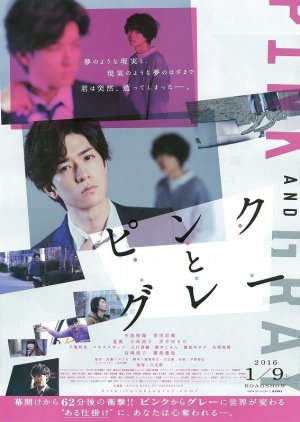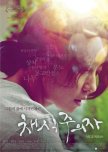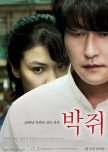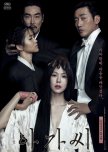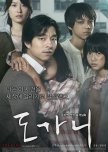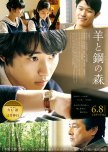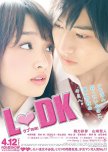
I really love Yukisada's use of light, color and tone here. And to me, that has always been a strength of his since serving as assistant director in April Story, Love Letter and Swallowtail Butterfly (yes, Shunji Iwai's films; hence, the similarity between the two's use of light and color).
Another signature of his is using timelines. He subtly uses that here too. He shows how characters develop, their experiences and how these changes them is a signature. Seeing that Pink and Gray is an adaptation from a novel, which bears similarity to his previous films as well. And finally, Yukisada likes to incorporate love and friendship in his narratives and make them focal points for his characters to develop. That is inevitably true here as well.
Needless to say, Yukisada stays true to his style. But also brings something new to the table. Here, the mystery element is something new. And say, even until the end, it's still mysterious. Not everything is answered. It's very...open-ended. His films to me, have a soft side to them and while the friendship aspect here is that, there's also this desire for answers. The second half of the film also has a daring decision he takes as a director. Is it effective? I think it depends on your cup of tea. It has a purpose to the overall story but it's metaphorical that in a way...seems unnecessary as well.
Perhaps applaud also goes to the great young actors here. Yuto Nakajima, an idol from Hey! Say! JUMP! and the film serves as his feature debut. It's easy to compare it to his co-star, Masaki Suda, a versatile actor with many features under his belt. But Nakajima shines as his own, playing dual characters with clarity: one being a pretty-face docile character and the other a more assertive one.
But since I have a personal bias towards Masaki Suda, my love still personally goes to him. Playing Riba-chan, an angry and even dark misfit is a role not foreign to Suda. In fact, roles like this are his best. Baring a charismatic and attractive demeanour, he also plays Naruse very well. That laugh while blood pours from his mouth is haunting. Kaho is very much the same. Playing a timid, quiet girl at first and then transforming to a seductive heiress. Love the addition of Yuya Yagira here too.
Besides the use of light, color and tone, I think that the score also makes the film feel much more sentimental. I really love how Yukisada played with the narrative here without dropping any hints whatsoever, the twist/reveal at the end makes it so much more satisfying.
Was this review helpful to you?

This review may contain spoilers
This is definitely Nakajima's best performance so far (it's amazing how MUCH he's grown as an actor the past 2 or so years!), Suda was amazing as usual, the cinematography and the colouring was amazing and the story itself was absorbing (even if the second half is slightly less good). 9/10 from me!! If this doesn't win some awards this year, I'll be shocked!The only downsides are: Nakajima still can't cry-act, and the reason for him (< this is NOT a spoiler before y'all start!) dying is stupid but everything else was phenomenal!
Was this review helpful to you?

This review may contain spoilers
Some films you see and they change you. This is one of those films. It comes in the form of something familiar, something nostalgic and becomes more sinister until you feel like you're no longer just watching but living it. And that you were in the nostalgic past and then stepped into a convoluted nightmare where nothing makes sense, and nothing is as it is.
There are rarely any far away shots, the entire movie is shot in extreme close ups, so what you see on screen is actually consistently partly concealed. So even when you're looking at someone there's a sense of secrecy always present, like you're only seeing parts of them and the rest is always off-screen, so much like the characters are trying to figure out the puzzle, so are you.
But the most beautiful effect was the way Rengo LITERALLY brings color to Daikis life in the end. Just mindblowing. This and the scene where in the black and white Daiki goes to meet Suda and when Suda is on the other side he's in bright light but Daiki is half-light half-dark. It was so beautiful because you see that despite being a bit rude the actor is more aware of the puzzle 'who is Rengo,' and also shows that the actor was also way more 'himself' and open than Daiki who seems very closed off in comparison.
And when there are far away shots, they're always usme color and tonal elements to show what a certain character is feeling, especially the use of dark and light, is just pure brilliance.
All the actors feel like a part of the canvas and not just good looking props.
And thanks to kaisrexci for recommending this one I'm so grateful, I might have taken me forever to find it otherwise ! !
Was this review helpful to you?

This movie is one of those movies that makes you think. Its deep, a bit disturbing and yet intriguing. The main actors Suda, Nakajima, and Kaho did a great job for this movie.
I recommend this one to those people who love deep stories, the types who love Murakami's novels.
Was this review helpful to you?

This review may contain spoilers
Pink and Gray is an amazing movie that sadly, is also very underrated.I watched this movie months ago, and I still can't stop thinking about it. It's one of those movies that really make you more conscious of what's surrounding you.
This movie contains one MAJOR plot twist which is what made me love this movie. To be specific (no spoiler ahead), until the first 40-50 minutes it was fairly interesting but after that, it became mindblowing, to the point where I started screaming and jumping around non-stop.
The actors did their job so splendidly that I felt like I was part of the movie myself.
Watch it and you'll love it, trust me.
Was this review helpful to you?

This review may contain spoilers
I don't know how to review this movie without mentioning spoilers in it, to be quite honest. Most of the plot is standing on twists, which makes it impossible to offer a review without revealing them. Still, I feel like the movie is worth an opinion, even if I'm super late to provide it. I haven't read Shige's books but, before seeing this movie, I saw Kasa wo Motanai Aritachi wa, for which I also left a review and, for that, I did read a detailed summary. I was in the dark with this one, didn't know more than what the description says, but for my experience with Shige's storytelling, it's very much his thing.
The movie has a twist in the middle of it, which makes you have to re-trace your steps and go back to the start. I appreciated that and, to be honest, I feel like that was the best thing in the whole movie. It's expected of a Shige story but unexpected for a movie like this one, and I don't think I've seen that tool used before in such a way.
I feel like there are a lot of missed opportunities in the second half of the movie, though. It was implied, through this half, that the real Gocchan wasn't like the one Dai had written in his book and performed in the first half. We found out some bits and pieces of his life as an idol, which were far from what Dai had idealized, and I wish that was the core of this part.
I wanted that discovery to be the center of the change, because it's what was shown to us throughout. We saw a very far-removed Gocchan, very private and stoic, very unreachable. This was Dai's idealized version, the one he wrote, the one he wanted to peform, and if the second half would have been a road towards unraveling this mystery and finding what Gocchan was actually feeling in this entretainment medium, if we could see what led him to taking his own life, uncovering the life Dai had always craved for and seeing it for real...that would have made sense.
Instead, the reason is pulled out of nowhere. It's given to this realtionship with a sister who showed up all but 2 minutes, something that makes no sense in the plot and I feel is just there for shock value. That "reveal" to me was not only underwhelming and a bit offputting, it was also in detriment to what the story had been building up to then. There are references to the sister here and there, the song he writes and the way he dies, but that's not enough to justify how much the movie's story was leaning elsewhere.
The second half is filled with these shock values, some of which are, I guess, understandable to showcase the raw nature of showbiz, but even though they add those things, they don't speak about showbiz in the way I feel the movie could have, given the story up to that point. I understand that Shige can't completely throw under the bus the industry that's giving him work but, at the same time, I wish the movie could have made something that made more storytelling sense and fit the theme it was carrying up to that point.
It's an interesting movie, a movie with very good storytelling devices and directorial decisions that make it stand out from the rest. Still, the simplification of its 2nd half made it a bit of a dissappointment to me, not enough to regret watching it but enough to wonder how a better outcome could have been.
Was this review helpful to you?

This review may contain spoilers
It was pink while it was someone else's but then it turned gray
I saw a comment where a person said this was their favorite movie and that's why I watched it.Did it become my favorite movie? No.
Did I like it? Yes.
Story
I was a little confused at first but I understood it at the end.
First, I didn't like any of the characters, they are all bad in some way but I'm not saying that's bad. They have flaws, they do stupid things.
I liked the first part of the movie more than the second but both of them were great. I think the second part showed the characters as they are while the first part was more what they are supposed to be.
Since the first part was the story and the second part was the reality I wondered how much of the story was real and how much was fake.
The bromance was interesting, I thought the bl fan in me looked too much into it but some scenes looked like they will escalate into something more. They were close and the chemistry was there. Those were my favorite scenes because the emotions were the best then. Especially the one when they see each other again after a long time.
There was a lot of subtext, things were hinted but never actually said. I think the whole movie is open for interpretation and there could be many meanings.
And at the end I think everyone will find their answer.
Was this review helpful to you?

This is how a plot-twist is done
This movie was brilliant and just deeply profound on many levels. There's a plot-twist that makes the whole thing swing around in the middle and go a completely different direction, and because the writing, direction, and acting were all absolutely first-rate, it all works. Is it all spelled out for everyone and tied up at the end in a neat little bow? No, because that's not how life works. This film has a lot to say about trauma, (inter-generational and one's own), fame, identity, art, shame, and hidden thoughts that we might not want to talk about out loud, but they end up emerging anyway. (If you've ever lost anyone to suicide, the very ending scene will make a lot of sense.)Suda Masaki was flawless, as usual, and I was very pleasantly surprised by Nakajima Yuto.
I had no expectations going into this film, but it will go on my 'best of' list now. Really well done.
Was this review helpful to you?

